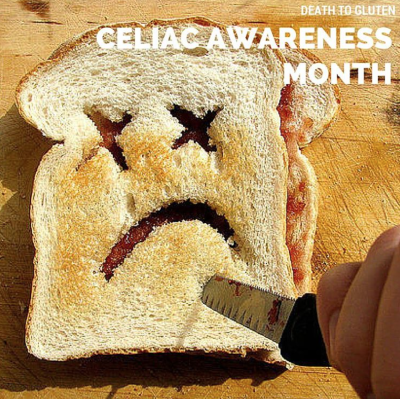
May is Celiac Disease Awareness Month and Represented by light green awareness pins, ribbons and wristbands.
Today’s post is about Celiac disease.
Celiac Disease and Celiac Disease Awareness Month
What is Celiac Disease? Celiac Disease Awareness Month raises awareness about Celiac disease. Celiac disease affects the small intestine. When someone who suffers from Celiac eats food with gluten in it, it triggers an immune response. This then causes the small intestine to become inflamed. One thing that not all people realize is that even short-term inflammation that occurs consistently leads to permanent damage. So, if someone with Celiac disease accidentally or unknowingly eats something with gluten in it a couple times a month, that adds up to long-term damage pretty quickly. The inflammation isn’t the only dangerous thing that occurs with Celiac disease. Celiac disease can prevent proper absorption of nutrients from food. This can lead to malnutrition or critical deficiencies in certain blood levels, for example iron or calcium. This is why so many people with Celiac also suffer from anemia and osteoporosis.
Symptoms
Each patient experiences Celiac disease differently and may not have all of the symptoms. One may not have diarrhea, but severe bloating instead. One may experience frequent vomiting and weight loss. Another may experience abnormal menstrual periods, intense cramping, anemia, and diarrhea. This combination that can look more like a reproductive issue than an intestinal one. As you can see, diagnosis may not be so readily apparent in all patients, which makes it difficult for some to be properly diagnosed. This results in people suffering for years, while permanent damage occurs to the body. Diagnosis is crucial in preventing serious long-term health issues that are caused by Celiac disease.
Autoimmune Diseases
In addition, diagnosis can be difficult due to another autoimmune disease. As discussed, Celiac disease is an autoimmune disease. Autoimmune diseases occur when the body’s immune response is triggered and the body tries to fight what it believes is a foreign invader. For people with autoimmune diseases, the body mistakes the body for invaders. Essentially, the body attacks itself, thinking that it is protecting itself. One autoimmune disease often brings his other autoimmune diseases. Many symptoms mimic other diseases or are very common across the autoimmune spectrum. It can take years to diagnose the first autoimmune disease, and only after that does it become clear there may be another one somewhere else. Some common autoimmune diseases associated with Celiac disease include Lupus, Thyroid disease, Type 1 Diabetes, Rheumatoid Arthritis, and Sjogren’s syndrome.
Reproductive Problems
There are other issues that Celiac can cause, as well. Women who suffer from Celiac may experience reproductive issues such as inconsistent menstrual cycles, infertility, miscarriage, and birth defects in their babies. This is largely due to poor nutrient absorption caused by Celiac. Children with Celiac can experience significant growth issues due to malabsorption. Other problems caused by Celiac can include osteoporosis, intestinal cancer (although rare), seizures, and more.
How To Get a Celiac Disease Diagnosis
So, how do you get a diagnosis? Well, it’s a fairly easy process, meaning that it is pretty painless. Your doctor will have to do a physical, and pay close attention to how you describe your symptoms. Food diaries may be requested. Your doctor will get a medical history, and may also ask about your family medical history.
Your doctor will likely order blood labs to test for certain antibodies that are high in people with Celiac disease. They may also draw labs for blood levels that can indicate malabsorption. In addition to those easier tests, you may be asked to provide a stool sample or be asked to do a biopsy of the small intestine. So, if you or someone you know suspects that Celiac disease may be the cause of health issues, don’t hesitate to make an appointment. It’s an easy conversation to have, and it could save you from doing years of damage to your body.
Personalized Cause and Celiac Disease Awareness Month
The purpose of this blog is to raise awareness for a myriad of causes. We strive to create a more educated and aware society by crushing misconceptions and stigma surrounding health issues. Personalized Cause® is the number one source for personalized awareness ribbons in the United States. We are the only company to provide low volume custom awareness ribbons. That means you can order just a single personalized awareness ribbon.
The Power of Awareness
Personalized Cause® believes in the power of awareness. We know that one personalized awareness ribbon can humanize a nebulous disease. It can also inspire others to become educated and participate in raising awareness and funding. Personalized Cause® was founded on the idea that every awareness ribbon represents a person to those that wear it. We believe that when you can connect a person to a cause. When you do this, it transform the way others see and understand that cause. Others see the person rather than just the illness. Custom awareness ribbons can be a silent sign of support. They can also be a symbol of courage, or even a source of inspiration. So, if you or someone you know is struggling or on a health journey, check out our custom awareness ribbons.
Celiac Disease and Light Green ribbons
Celiac disease is represented by a light green awareness ribbon. If you would like to order a custom light green awareness ribbon for Celiac disease, please visit us at www.personalizedcause.com.
#celiac #celiacdisease #celiacawareness #celiacsucks #gluten #glutenfree #inflammation #autoimmune #nutrition #cancerribbons #awareness #awarenessribbon #autoimmune #chronicillness #invisibleillness #chronicpain
